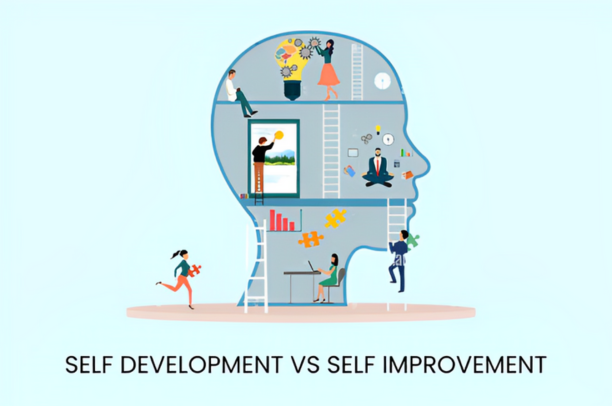Introduction:
Are you curious about self-development versus self-improvement? While these terms are frequently used interchangeably, they describe distinct approaches to human development. In this post, we’ll look at the slight but significant distinctions between the two notions and help you decide which path best suits your needs.
Key differences between self-development and self-improvement.
When it comes to personal development, two concepts frequently come up in discussions: self-development and self-improvement. At first glance, they may appear to be synonyms, but a closer look reveals that they approach personal development from different perspectives. So, what is the distinction between self-development and self-improvement? Let us break it down.
What is Self-Development?
Self-development refers to the ongoing process of learning, growing, and changing as an individual. It’s all about honing your talents, thinking, and general character to better prepare you for the future. The goal here isn’t just to fix something; it’s to create something new and maximize your potential.
Consider self-development as a proactive endeavor. It’s similar to sowing seeds in the garden and nurturing them over time. For example, learning a new talent can help boost your job.
- Enhancing emotional intelligence for better relationships.
- Developing leadership skills to encourage others.
Unlike self-improvement, self-development is typically long-term and linked to a larger vision of your life. It is more than just managing immediate difficulties; it is also about establishing chances for long-term success.
What is Self-Improvement?
On the other hand, self-improvement entails identifying particular areas of your life that require attention and taking action to address them. It is frequently centered on problem solving, overcoming obstacles, or implementing incremental changes.
Consider it as troubleshooting in your personal life. Perhaps you’ve recognized you procrastinate excessively or have difficulty managing your time effectively. Self-improvement would entail taking steps to change these tendencies. Examples of self-improvement include
- Reading books on productivity to overcome procrastination.
- Joining a fitness program for better health.
- Mindfulness meditation can help relieve stress and anxiety.
- In a nutshell, self-improvement is task-driven and immediate. It is about repairing the cracks in your foundation to make it stronger.
Key Differences between Self Development and Self Improvement
Now that we’ve defined both terms, let’s dig into how they differ:
| Aspect | Self-Development | Self-Improvement |
| Focus | Growth and evolution over time | Fixing specific issues or weaknesses |
| Approach | Long-term and proactive | Short-term and reactive |
| Examples | Building leadership skills, expanding knowledge | Tackling procrastination, improving fitness |
| Goal | Personal transformation and self-actualization | Addressing immediate challenges |
How are they similar?
Self-development and self-improvement have certain differences, but they are not mutually exclusive.In fact, they complement one another! Self-improvement can be a stepping stone to self-development. For example, overcoming your procrastination tendencies (self-improvement) can free up time for you to study a new language or start your own business.
Both principles involve self-awareness. Whether you’re looking to improve individual habits or achieve general improvement, you must first comprehend where you are now and where you want to be.
Is Self-improvement Worth It?
Absolutely! Self-improvement may focus on short-term solutions, but those changes might have long-term consequences. For example
- Overcoming procrastination can lead to increased productivity.
- Improving fitness increases energy and confidence.
- Reducing negative thought patterns promotes improved mental health.
While self-improvement is worthwhile, don’t stop there! Use it as a foundation to create a larger vision for yourself through self-development.
When to Concentrate on Self Development vs. Self-Improvement.
So, how do you choose which one to prioritize? It all relies on your existing demands and objectives.
Choose self-improvement.
- If you are experiencing a certain obstacle or shortcoming.
-You require speedy and effective solutions.
-Your goal is to change anything in your life (e.g., poor behaviors). - Select Self-Development
-If you are ready for long-term growth.
-Plan ahead for future prospects.
-You prioritize personal transformation.
Practical Tips for Self-Development and Improvement
Here are some practical suggestions to help you get started with either (or both):
For Self-improvement:
• Determine which habit or issue you want to improve.
• Set specific, measurable, achievable, relevant, and time-bound goals.
• Use habit trackers or productivity apps to keep on track.
For self-development:
• Make a vision board for your future aspirations.
• Invest in personal development training or coaching.
• Set aside time each week to reflect on your growth journey.
Final Thoughts
Understanding the distinction between self-development and self-improvement is critical for anyone seeking personal growth. While self-improvement allows you to change what isn’t functioning, self-development encourages you to become the best version of yourself.
So, would you prioritize self-development or self-improvement? The option is yours, and the adventure begins today with us at mindspaindia@gmail.com or +91 9325406967. Visit mindspaindia.com to learn about self-development and self-improvement.

